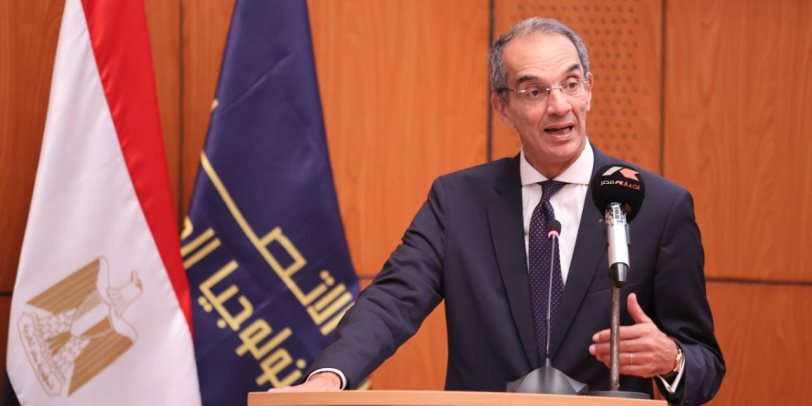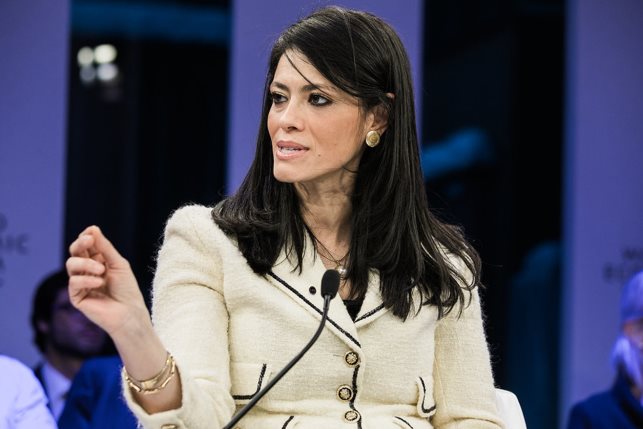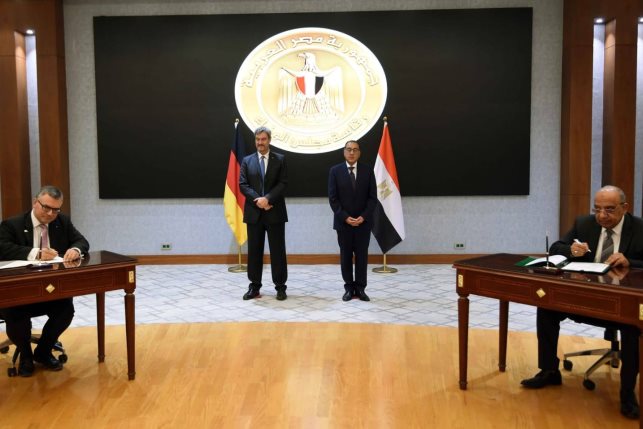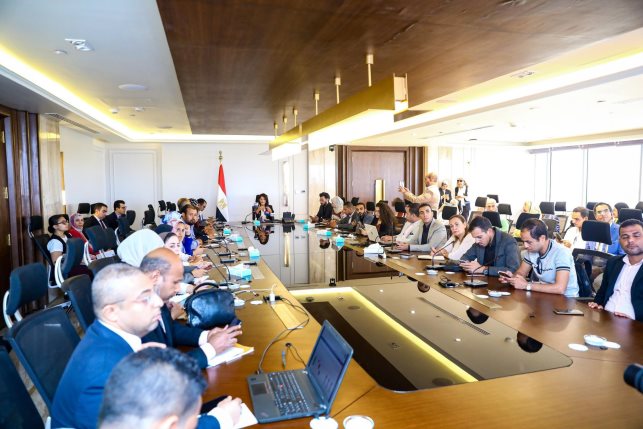Continuity in Egypt's Tech Leadership: Dr. Amr Talaat's Reappointment Signals Stability, Continues Streak
Dr. Amr Talaat's reappointment marks a pivotal moment for Egypt's communications sector.
 Dr. Amr Talaat, Egypt's Minister of Communications and Information Technology | FILE PHOTO
Dr. Amr Talaat, Egypt's Minister of Communications and Information Technology | FILE PHOTO
Dr. Amr Talaat has been reappointed as Egypt's Minister of Communications and Information Technology in Prime Minister Mostafa Madbouly’s cabinet, after taking the oath of office before President Abdel Fattah al-Sisi.
During his previous tenure, the communications and IT sector witnessed remarkable growth, as evidenced by several key performance indicators and exceptional growth rates across various domains.
Dr. Talaat places a high priority on digital transformation, enhancing telecommunications and internet infrastructure, training youth, establishing innovation centers, supporting startups, increasing digital exports, and continuing the modernization of postal services.
The minister emphasized the ongoing implementation of the ministry’s strategy to build a digital Egypt. This involves numerous projects aimed at advancing digital transformation across all sectors, attracting foreign investments, building digital capabilities, fostering technological innovation and entrepreneurship, and localizing electronics manufacturing.
For five consecutive years, the communications and IT sector has maintained its position as the fastest-growing sector in the country. The sector’s competitiveness has also increased, drawing attention from many global IT companies that have expanded their operations in Egypt, spanning various IT fields, cross-border services, and electronics manufacturing.
The sector achieved growth rates of approximately 16.3%, making it the highest-growing sector among various state sectors for five years in a row. The sector’s contribution to the gross domestic product (GDP) reached 5%.
Digital exports grew to $6.2 billion in 2023, marking a 26.5% increase from 2022. Egypt ranked third globally in the “Cross-border Outsourcing Confidence Index 2023.”
Egypt advanced in the World Bank’s Government Digital Readiness Index 2022, ranking among the leading countries in digital government with an “A” rating, up from a “B” in 2020 and a “C” in 2018.
Ookla awarded Egypt the title of “Fastest Fixed Internet in Africa,” reflecting the significant improvements in internet speeds.
Over two years, Egypt improved by two positions globally in the ranking of freelancers per capita, moving to fourth place from sixth. Additionally, Egypt climbed six positions in the share of the global freelance workforce, reaching eighth place from fourteenth.
Egypt led the African continent in the Tortoise Media Global AI Index 2022 and improved by 17 points in the digital capabilities sub-index between 2021 and 2022.
In the Government AI Readiness Index, Egypt’s ranking improved by 49 points, rising from 111th place in 2019 to 62nd place in 2023.
The launch of the Digital Egypt platform for government services now offers 170 services across various sectors, with over 8 million registered users conducting more than 45 million transactions.
The national information infrastructure project, in collaboration with the Administrative Control Authority, aims to enhance comprehensive planning and address database duplication. Over 100 government databases have been interconnected, comprising all citizen data held by the government.
New phases of digital services built on electronic signatures are underway, integrating e-signature technology with various government applications.
The Unified Government Services Card was launched in Port Said, in collaboration with the Ministry of Supply and Internal Trade, the Comprehensive Health Insurance Authority, and Visa. The card aims to streamline access to government entitlements, both cash and in-kind, and ensure governance of digital service payments. The first phase includes services for rationing, comprehensive health insurance, and electronic payments, with plans to add more government services in subsequent phases and expand the card’s use to other governorates.
The unified national ID for properties helps document ownership and identify property owners uniquely, reducing legal disputes over ownership and protecting property investment through documentation.
Numerous projects have been implemented to enable state sectors to transition to digital systems, including the comprehensive health insurance system, justice and law enforcement systems, and university hospital automation.
The AMHS project targets restructuring procedures and applications within government entities.
The national AI strategy, developed with the Ministry of Higher Education and Scientific Research, aims to leverage AI technologies to support Egypt’s sustainable development goals. The second phase of the strategy is being prepared to align with the rapid advancements in generative AI, particularly large data models and their various applications.
The first phase of the Knowledge City in the New Administrative Capital has been completed, incorporating the latest technologies. The city includes four buildings: a training facility housing the National Telecommunications Institute and the Information Technology Institute, the National Academy for Information Technology for Persons with Disabilities, and the Imhotep Center for Creativity and Development, along with Egypt’s Informatics University.
The inauguration of eight Digital Egypt Innovation Centers in Aswan, Qena, Sohag, Minya, Monufia, Ismailia, Mansoura, and Cairo brings the total number of centers to 20. These centers aim to foster a conducive environment for technological innovation, entrepreneurship, and digital skills development across all governorates.
Each center includes specialized technological labs, training centers, event and workshop spaces, technological incubators for startups, and connections between youth, investors, and major global and local companies in innovation and entrepreneurship.
Notably, the Digital Egypt Innovation Center in Sultan Hussein Kamel Palace and the Digital Egypt Innovation Center in Giza have been established, reflecting the state’s interest in converting historical and cultural buildings into digital innovation centers while preserving their architectural and heritage value.
Egypt ranks among the top three countries in the Middle East and North Africa for attracting investments in tech startups.
Training budgets have increased by 50 times over ten years, with the number of trainees rising 150 times, from 2,600 trainees with a budget of EGP 32.5 million in the 2014/2015 fiscal year to 400,000 trainees with a budget of EGP 1.7 billion in the current fiscal year.
The “Digital Egypt Generations” initiatives provide free digital skills training for various age groups, from primary school students to university students and graduates, covering modern telecommunications and IT specializations such as AI, data science, cybersecurity, embedded systems, digital arts, enterprise resource management, and more, in line with local and global labor market requirements. The initiatives are implemented in collaboration with leading international universities and local and global telecommunications and IT companies.
These initiatives include the Digital Egypt Buds, Digital Egypt Cubs, Digital Egypt Pioneers for university students and graduates from all disciplines, and Digital Egypt Builders.
Under these initiatives, memorandums of understanding have been signed with 30 local and global companies to build digital capacities for participants.
The “Maharat Tech” e-learning platform of the Information Technology Institute has trained over half a million people.
Twelve WE Schools of Applied Technology have been established in collaboration with the Ministry of Education and Technical Education in Cairo, Giza, Alexandria, Dakahlia, Suez, Minya, New Valley, Qalyubia, Assiut, Qena, Beheira, and South Sinai. These schools are the first smart schools specializing in communications and IT, aiming to prepare a workforce capable of competing in the labor market with the highest standards of efficiency and quality.
Technological zones have been established in Borg El Arab (Alexandria), New Assiut (Assiut), Sadat City (Monufia), and New Beni Suef (Beni Suef), equipped with the necessary infrastructure to support telecommunications, IT, and innovation activities, as well as other service and production activities, especially those capable of employing large numbers of university graduates. These zones also encourage investments in electronics manufacturing and supporting industries.
The four technological zones have achieved occupancy rates of up to 70%.
A comprehensive plan has been implemented by Telecom Egypt, with investments of $2.5 billion since 2018, to upgrade telecommunications infrastructure nationwide using the latest global technologies, including fiber optics. Efforts to enhance internet efficiency have resulted in a tenfold increase in fixed internet speed over the past six years, reaching 75.44 Mbps in May. Egypt now ranks first in Africa for fixed internet speed, up from 40th place in early 2019, according to Ookla.
The 5G license has been issued to operators in Egypt, with Telecom Egypt becoming the first provider of 5G services in the country.
A project is underway to connect all 31,500 government buildings nationwide to the fiber-optic network, ensuring stable service even during internet outages. So far, 20,000 government buildings have been connected, with ongoing efforts to link the remaining buildings.
New frequency bands have been allocated to licensed mobile service providers in Egypt, offering 130 MHz in the 2600 MHz band, generating revenues of around $2 billion. This ensures network readiness for future telecommunications and IT services, meeting the increasing demand for communications services in the Egyptian market and supporting digital transformation and the construction of a digital Egypt.
A regulatory framework has been established for new licenses to build and lease wireless communication towers, aiming to expand coverage and enhance service quality by increasing the number of towers to accommodate the growing number of users in the Egyptian market.
Three new submarine cable landing stations have been inaugurated in Ras Ghareb, Zafarana, and Sidi Kerir, bringing the total to ten stations, enhancing international infrastructure and ensuring service continuity and reliability for countries benefiting from international connectivity services.
The long-awaited guideway route, a fiber-optic cable route for internet services between the Red Sea and the Mediterranean Sea, has been completed within one year, realizing a 20-year ambition of the telecommunications and IT sector.
The number of international routes traversing Egypt for international data services has doubled, adding five new routes spanning 2,650 km over two years, compared to six routes spanning 2,700 km before 2019, bringing the total to 11 routes.
The new Red2Med submarine cable, wholly owned by Telecom Egypt, has been inaugurated, providing the shortest and fastest data transfer route between East and West, and the most secure.
An international maritime connectivity agreement has been signed between Egypt and Greece, another agreement to establish the first submarine cable linking Egypt and Albania to transfer data from Asia to Europe, along with agreements to establish a submarine cable system connecting Southeast Asia to Europe.
The digital postal network has been expanded to include 4,500 offices nationwide, and 1,100 postal kiosks have been established.
Egypt Post has won the International Postal Development Award in 2021 and 2022 for its achievements in digital transformation and financial inclusion. It has also ranked first in North Africa and second in the Arab world in the UPU Integrated Index for Postal Development 2022.
Dr. Amr Talaat has been reappointed to oversee these ongoing projects and ensure their successful implementation, further solidifying Egypt’s position as a leading digital hub in the region.





